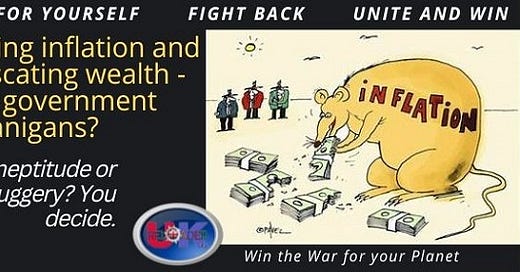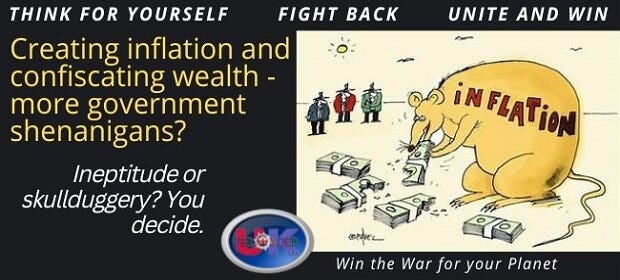Creating inflation and confiscating wealth – more government shenanigans?
INEPTITUDE OR SKULLDUGGERY? YOU DECIDE.
SOURCE: UK RELOADED
Intro by Kieron McFadden
The following featured article highlights this phenomenon: inflation is not something that “just sort of happens” outside of government’s control. It is, either through ineptitude or malice aforethought (or some combination of the two) created by government.
To fully understand it, it is first necessary to understand what money is:
Money is an agreed upon system of tokens or symbols that we have agreed represent goods and services. The symbols or tokens are exchanged back and forth among us in lieu of goods and services, confident that we can exchange those symbols or tokens for goods and services any time.
The symbols or tokens can take various forms depending on what is agreed upon: coins, notes and even numbers in computers (digital money) or even notched sticks of wood as were once used in England (Tally Sticks) and dried yak’s dung as once used in Tibet.
The basic of money is exchange among people of goods and services and it provides a great deal of flexibility to the exchange of goods and services that direct exchange (barter) cannot provide. In other words its role is to FACILITATE (make smooth or easy) exchange.
Inflation occurs when too much money is circulated relative to the amount of goods and services it represents.
Recently, during the Covid fake pandemic, governments constricted the amount of exchangeable goods and services people were able to produce whilst pumping a great deal of extra (borrowed) money into the economy. This, as we predicted at the time was a recipe for inflation.
When inflation occurs, the value (purchasing power) of your pound or dollar declines. because there is more of it chasing the same or reduced amount of products. Thus the purchasing power (value) of your wage packet, pension or savings declines.
The formula for handling inflation by government is:
Assist, help, reward, bolster, cease to inhibit and thus increase production whilst ceasing to pump new money into the system.
The way to further or worsen inflation is to continue to inhibit, penalise or otherwise crush production whilst continuing to pump more excess money into the system. In is of course also the recipe for impoverishment of the nation and its people.
There is a further complication and agony in that governments nowadays do not themselves create the new money they pump into the system.
Dimwitted governments a long time ago handed to the banking cartels the right to create new money and now borrow that money at interest from those banking cartels and then pump the borrowed new money into the system. They must of course later repay that money (plus interest which means they must repay more money than was created in the first place), which they do by extracting the money from the people via taxation.
So as well as creating inflation to make people miserable government at the same time increases the debt burden.
All this is hidden behind a smoke screen of complexity they call “economics” but it is the basic mechanism by which the most technologically advanced, productive and (once) free society in history has been ruined and its people robbed of the fruits of their success.
So bear all this in mind as you read the following article.
(And for a more thorough understanding of how the debt-based money system works to your detriment, please read: The Worm in the Apple)
Confiscation of private pension savings – what is the government planning?
Investing.com – High inflation is increasingly becoming a constant factor in our lives. But while increasingly expensive food is leading to real existential fears, countries are once again intending to use this situation for debt reduction by carrying out hidden expropriations.
That this is a very effective tool was explained by Carmen Reinhart and M. Belen Sbrancia in a paper published by the International Monetary Fund (IMF) in January 2015.
The paper describes that the debt of a state can be reduced particularly well in an environment of high inflation. They refer to a so-called “financial repression”, with the help of which it is possible to deprive savers of their money and thus improve the state’s finances.
This happened, for example, after the Second World War, which caused the debts of all countries involved to explode.
Between 1945 and 1980, real interest rates were negative for half of this period. Inflation was thus higher than the market interest rate, as is currently the case again in Europe.
The authors of “The Liquidation of Government Debt” found that the 12 industrialised countries studied reduced their debt by an average of 1 to 5 per cent of GDP annually in the post-war period until 1980.
They conclude that another period of high inflation should be used to restructure government finances again.
This is exactly what is likely to happen in the next few years, as macro analyst Nick Giambruno explained.
The tool of choice for governments to access the people’s money is government bonds. As an example, Giambruno cites inflation of 9 per cent and an interest rate of 4 per cent. The resulting real interest rate of -5 percent would lead to a continuous transfer of wealth from the lender (buyer of government bonds) to the borrower (government) amounting to 5 percent.
Those who now believe that they would not be affected by such a robbery because they do not hold government bonds are very likely mistaken. Because everyone who has a fixed-interest asset provision or a private pension plan will also be invested in government bonds without knowing it.
There is almost no alternative to this mechanism, because if bondholders realise what is happening, the state will restrict flight from bonds by law, as Giambruno notes.
The withdrawal of capital from this sector can be managed very effectively with capital controls. Moreover, there are ways to even “acquire” new capital for government bonds. Private pension funds can have certain compulsory quotas imposed on investments in government bonds under the pretext of providing more security.
In parallel, it is likely to be heard more and more often in the media that high inflation is due to problems in the supply chain and the Ukraine war – i.e. outside the sphere of influence of governments and central banks.
In Giambruno’s view, it would also be conceivable that inflation is officially lower due to new calculation methods and/or that the inflation target is raised.
Regarding the cause of inflation, economist Daniel Lacalle debunked the widespread argument that business drives up prices with its pricing power – companies cannot cause overall inflation as we are currently experiencing.
Lacalle reasons that businesses are in constant competition. And in competition with rivals, prices are more likely to be lowered than raised.
Even an oligopoly would inevitably be subject to this mechanism and could only determine a few prices in the short term, but never all market prices.
Lacalle cites the oil market and OPEC as an example. The cartel, despite all its efforts, does not succeed in keeping the price of oil above $80 per barrel in nominal terms, let alone adjusted for inflation. This makes the idea that a few big companies are drivers of inflation absurd.
The only thing that causes significant inflation is the weakness of a currency when there is too much of it in circulation. That is why a large European corporation raises its prices by 20 per cent in Germany and only by 7 per cent in Switzerland. Because new euros are printed faster in the Eurozone than CHF in Switzerland, Lacalle explains.
Governments, however, are keen to pass the buck of inflation on to someone else. Because that way no one gets the idea that they themselves are benefiting from the fact that prices are rising. Lacalle writes:
“Governments never put the brakes on inflation because they are the biggest beneficiaries. Money creation is never neutral and disproportionately favours the only monopolist in the economy: the state that issues the currency.”
(Translated from German using DeepL)




